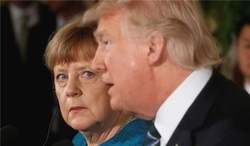 There is a deep divide between US and German citizens when it comes to how they view the relationship between Washington and Berlin, with almost two-thirds of Germans having a negative view of US-German ties, according to a new survey.
There is a deep divide between US and German citizens when it comes to how they view the relationship between Washington and Berlin, with almost two-thirds of Germans having a negative view of US-German ties, according to a new survey. RNA - The survey by the Pew Research Center in Washington and the Körber Foundation in Hamburg found that 64 percent of Germans see relations with the US as “bad”. Only 2 percent of Germans say the relationship with the US is “very good”, compared with 13 percent of Americans, World News reported.
Americans and Germans also differ over which country is most important to their own nation’s foreign policy. Germans said France is the most or second-most important partner for their country, while Americans name the UK.
The poll suggested that the two largest nations in the NATO alliance (in terms of economy and population) are deeply divided in their views of the relationship.
US military bases in Germany, a legacy of American occupation after World War II, drew similar divisions. Some 85 percent of Americans said they were important for US national security, while 52 percent of Germans said the same of German security.
US President Donald Trump and German Chancellor Angela Merkel will meet in London for NATO's 70th anniversary in early December. Trump has frequently criticized German policies and has a cold personal relationship with Merkel.
German pessimism about the relationship with the United States was largely due to the behavior of Trump, who has demanded that Germans spend more on the military and threatened auto tariffs on German companies, stated Sudha David-Wilp, a senior fellow at the German Marshall Fund in Berlin.
"President Trump is an existential threat to Germany," David-Wilp said, noting that previous Pew polls had shown confidence in the current US president dropping to 10 percent last year, down from a high of 93 percent at the start of President Barack Obama’s administration.
But David-Wilp noted that the two countries have also experienced tensions over geopolitical issues before Trump, including the disputes over the invasion of Iraq in 2003 and the revelations 10 years later that the United States spied on Merkel.
The differing views of the alliance may be due in part to an information gap between Germans and Americans, she added.
"Germans are definitely well-informed when it comes to current affairs," she stressed, as their nation is central to European policy and has an export-driven economy. Americans, on the other hand, tend to think of themselves as the "middle of the world, the center of the universe".
847/940